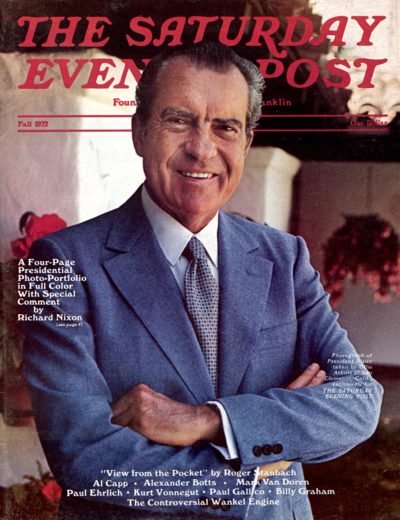
Buried in the archives of The Saturday Evening Post are treasures from the nation’s nearly 300 years of history, whether in vintage advertising, classic illustrations, or insightful reporting that illuminates life in America of decades now passed.
Frequently we find old articles with an interesting point of view, providing us with insight on specific historical events from the people who lived through them.
And in the case of this gem from our Fall 1972 issue (right), some articles look much different when measured with the hindsight of history.
Then-President of the United States Richard Nixon wrote this letter for the Post in relation to a photo essay by official White House photographer Ollie Atkins, which appeared in the same issue. The full text of Nixon’s letter appears below. Click here to see the photo essay as it originally appeared in the Post.
To Communicate Dimensions of Truth
By Richard Nixon
In the archives and libraries of America are carefully preserved the records of each of our Presidents—letters, minutes, diaries, memoranda—and now even tape—recorded interviews with those who are a part of past administrations. But only in recent times has the strong effort been made to preserve a complete photographic account of Presidential history.
Though I often joke with Ollie Atkins, the official White House photographer, about his persistent efforts always to be in the right place at the right time with his cameras, I must say that I am very happy indeed with the modern practice of keeping a full photographic record of the Presidency. For as I look over Ollie’s pictures, including those which make up the photographic essay on these pages, I realize again their unique ability to communicate dimensions of truth which are often missed in the written record.
Through these pictures, for example, I can feel again the sense we all had in Peking and Moscow of participating in one of history’s watershed moments. And I am reminded, too, as I look through these photos, of nuances of personality in those I have known which are sometimes difficult to put into language. By helping to preserve the mood, the spirit, the character of a person or an event—or an entire administration—the photographer can perform, I believe, a unique public service.
When historians study all the records of the Nixon years, I hope they will conclude that these were good years, years in which we ended a difficult war, achieved significant arms control agreements and made peaceful negotiation the way of life among nations. I hope, too, that this Administration will be remembered as one which reordered an economy which had grown dependent on wartime spending, decentralized and revitalized a Federal bureaucracy which had grown rigid and unresponsive, and helped a divided Nation substitute the rule of reason for confrontation and disorder.
There have been moments of disappointment in these years, of course, but there have been many more moments of great satisfaction. After nearly four years as President, I believe we can be proud of the record we are leaving for those who will write the history of this Administration—even as I am proud of this photographic essay concerning some of its highlights
{signed} Richard Nixon
PRESIDENT OF THE UNITED STATES
Become a Saturday Evening Post member and enjoy unlimited access. Subscribe now
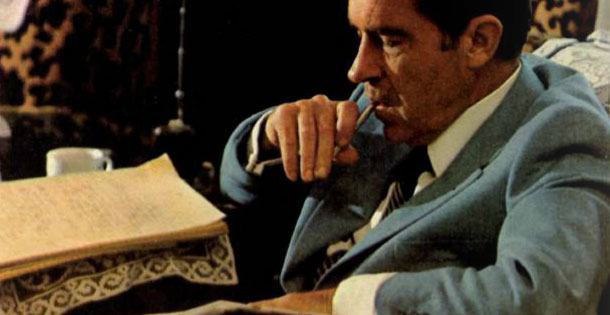
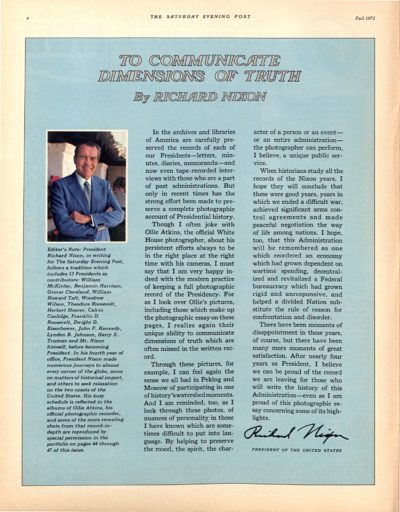
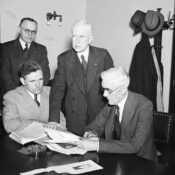
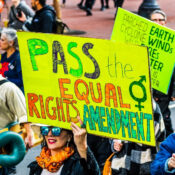
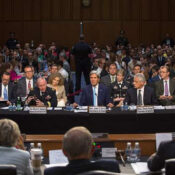
Comments
I agree with President Nixon’s comments and assessments of how he felt his Presidency would be remembered and judged by future historians, and indeed still should be. In 2 months it will be the 42nd anniversary of the Watergate Break-In, which unfortunately grew into the scandal that eventually became an out of control monster starting just a few months after his extremely successful re-election when this Fall ’72 POST was still recent.
The hows and whys of Watergate are two of the most baffling and tragic questions in American politics and history. His Presidency, like JFK’s are riddled with questions that can forever be speculated on for answers, but never really BE answered.
I can’t answer it here, and won’t attempt to. It doesn’t make sense unless for whatever reason, Nixon felt there was national security at stake and approved it. If so he should have been upfront about it, told the press it fortunately wasn’t anything serious, and we can all be relieved. It would have been neutralized quickly, especially back then.
If he didn’t know about it, didn’t know who all of the parties were who WERE behind it, he should have spearheaded his own Watergate investigation demanding getting to the bottom of it, and if that meant prosecution of members of his own administration, than so be it!
The real tragedy of Watergate was the cover up of it and the destruction of his Presidency as a result including all of the good things he did as President that he SHOULD be remembered for, just as he stated in 1972. I think the time is long overdue for things to come full circle for the 37th President, and if not to eradicate it, at least put the cancer of Watergate into a permanent remission when all is taken into account.
Richard Nixon was seen and heard.
With J.F.K. he did debate.
He might have won if just his word
Was how he did communicate.
But T.V. showed his puffy face,
Against the handsome J.F.K.
In history – Nixon a case
Of how not to be on display.
At last, as Prez, Nixon did choose
Few pictures, but tapes did abound.
And by that choice, Nixon did lose.
Should have been pictures, but no sound.
Truth of seen and heard be tricky.
Nixon should have been more picky.